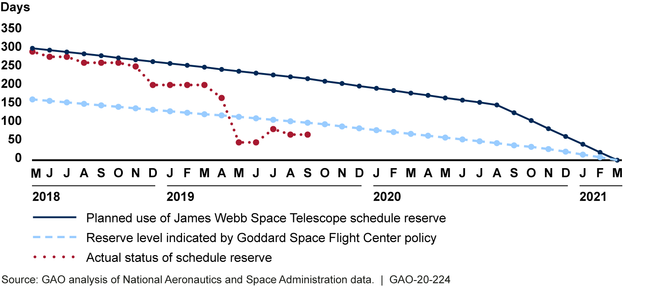James Webb Space Telescope: Technical Challenges Have Caused Schedule Strain and May Increase Costs
Fast Facts
The James Webb Space Telescope is the planned successor to the Hubble Telescope. Costs for the project have already increased by 95% and the launch date has been delayed by more than 6.5 years.
Technical issues with certain spacecraft components in 2019 have made it unfeasible for the project to launch by its goal of November 2020. Instead, the project is working towards its official rescheduled launch date of March 2021. But a recent cost and schedule analysis, which we recommended in our last report, found the project unlikely to meet this date.
James Webb Space Telescope

James Webb Telescope
Highlights
What GAO Found
The National Aeronautics and Space Administration's (NASA) James Webb Space Telescope (JWST) project has made significant progress since GAO's last report in March 2019, such as completing testing of the observatory's individual elements and integrating them together in August 2019. However, new technical challenges have required the project to use more schedule reserve—extra time set aside in the project's schedule to accommodate unforeseen risks or delays—than planned. As of October 2019, the project had used about 76 percent of its available schedule reserve and no longer plans to launch in November 2020 (see figure). The project is now managing to a March 2021 launch date but estimates only a 12 percent likelihood that this date will be achieved. NASA plans to reassess the launch date in the spring of 2020.
Planned and Actual Schedule Reserve for James Webb Space Telescope

The project used much of the schedule reserve in April 2019 to address issues with two components needed to transmit science data to ground control. The contractor has been able to mitigate some of the schedule loss and continues to look for new efficiencies. Technical challenges also resulted in longer employment of the contractor workforce than planned, which could result in additional cost increases. NASA continues to monitor multiple, other risks that could place further schedule and cost strains on the project.
Since NASA replanned the project again in June 2018, the agency has taken steps meant to improve performance and oversight. NASA has addressed all recommendations from an independent review board, but in doing so sometimes took actions that differed from those outlined in the board's report. NASA has sustained, and in some cases expanded, oversight initiatives following the revised cost and schedule commitments that, in many cases, were designed to enhance communication between the government and the contractor.
Why GAO Did This Study
JWST, a large, deployable telescope, is one of NASA's most complex projects and top priorities. Problems discovered during integration and testing caused multiple delays that led NASA to replan the project in June 2018. Now estimated to cost $9.7 billion, the project's costs have increased by 95 percent and its launch date has been delayed by over 6.5 years since its cost and schedule baselines were established in 2009. Prior to the replanning process, an independent review board assessed the project and made recommendations to improve performance and oversight.
Conference Report No. 112-284 included a provision for GAO to assess the project annually and report on its progress. This is GAO's eighth report. This report assesses the extent to which (1) the project is executing within its revised cost and schedule targets and (2) NASA has implemented and sustained key improvements to performance and oversight established following the June 2018 replan. GAO reviewed relevant NASA policies, analyzed NASA and contractor data, and interviewed NASA and contractor officials.
Recommendations
GAO is not making any new recommendations at this time. GAO has made several recommendations to NASA on the management of this project in previous reports and NASA has agreed with and taken action on many of them. Most recently, in March 2019, GAO recommended that NASA complete a joint cost and schedule confidence level analysis for JWST. NASA concurred and completed the analysis in October 2019 to support a key project review.
